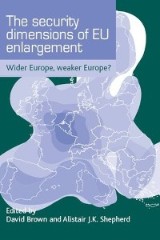Details

The security dimensions of EU enlargement
Wider Europe, weaker Europe?|
37,99 € |
|
| Verlag: | Manchester University Press |
| Format: | EPUB |
| Veröffentl.: | 15.06.2021 |
| ISBN/EAN: | 9781526162847 |
| Sprache: | englisch |
DRM-geschütztes eBook, Sie benötigen z.B. Adobe Digital Editions und eine Adobe ID zum Lesen.
Beschreibungen
The changing nature of security, the enlargement of European institutions and the evolving functions of the EU have been key developments in post-Cold War Europe. This book blends these three crucial developments in a sophisticated and illuminating manner. It assesses the impact of EU enlargement on both pre-existing security arrangements and key relationships with the EU’s new partners and ‘neighbours’. It also investigates both hard and soft, and internal and external security issues, ranging from military intervention to terrorism and from organised crime to human rights. From this it concludes that enlargement has both positive and negative implications for European security. Completing the analysis, this study examines the evolving security relationships with key states, regions and international organisations in the EU’s ‘neighbourhood’. The examination of relations with Turkey, Russia, Ukraine, the Greater Middle East and the Balkans provides a sense of the direction in which European security politics is moving.
The security dimensions of EU enlargement is a critical and comprehensive analysis of security in an enlarged EU. It will be essential for understadning the EU's roles as a security actor in the twenty-first century
Introduction: security and enlargement into the twenty-first century - Alistair J.K. Shepherd 1. EU enlargement and NATO: the Balkan experience - Martin A. Smith 2. The implications of EU enlargement for the European security and defence policy - Alistair J.K. Shepherd 3. The impact of enlargement on the EU’s counter-terrorist framework - David Brown 4. The external shield of internal security: the EU’s emerging common external border management - Jörg Monar 5. EU enlargement and organised crime: Transdniestria as a case study - Graeme P. Herd and Anne C. Aldis 6. Enlargement and human rights law: norms and realities - Karim A. A. Khan and Anna Kotzeva 7. An assessment of the Baltic States contribution to EU efforts to prevent proliferation and combat illicit arms trafficking - Paul Holtom 8. Russia-EU relations: opportunities for a security dialogue - Dmitry Polikanov 9. Russia-EU relations and the Chechen issue - Tracey C. German 10. A leap forward to Europe: the impact of the ‘Orange Revolution’ on EU-Ukraine relations - Rosaria Puglisi 11. The EU and Turkey: bridge or barrier? - Bill Park 12. EU enlargement and security in the Mediterranean region - Roderick Pace 13. A successful stability pact: European Union policy in South-East Europe - Anthony Welch Conclusion: the security implications of EU enlargement - David Brown
David Brown is Senior Lecturer in Defence and International Affairs at the Royal Military Academic Sandhurst. Alistair J.K. Shepherd is Lecturer in European Security at the Department of International Politics at the University of Wales, Aberystwyth
The changing nature of security, the enlargement of European institutions and the evolving functions of the EU have been key developments in post-Cold War Europe. This book blends these three crucial developments in a sophisticated and illuminating manner. It assesses the impact of EU enlargement on both pre-existing security arrangements and key relationships with the EU’s new partners and ‘neighbours’. It also investigates both hard and soft, and internal and external security issues, ranging from military intervention to terrorism and from organised crime to human rights. From this it concludes that enlargement has both positive and negative implications for European security. Completing the analysis, this study examines the evolving security relationships with key states, regions and international organisations in the EU’s ‘neighbourhood’. The examination of relations with Turkey, Russia, Ukraine, the Greater Middle East and the Balkans provides a sense of the direction in which European security politics is moving.
Diese Produkte könnten Sie auch interessieren:

Die europäische Austeritätspolitik aus der Perspektive des Neogramscianismus

von: Bastian Tölke

29,99 €
















